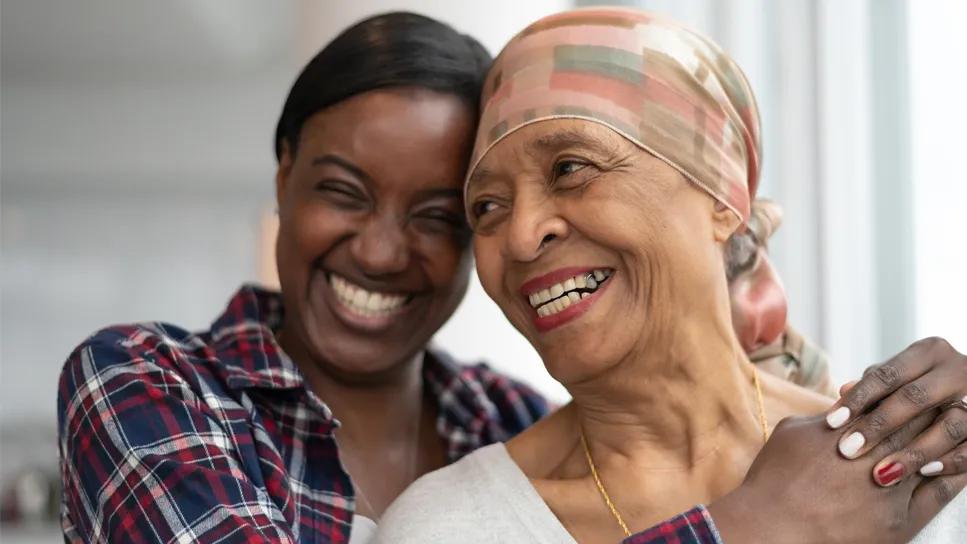Blinatumomab plus chemotherapy improves overall survival and relapse-free survival over chemotherapy alone

Image content: This image is available to view online.
View image online (https://assets.clevelandclinic.org/transform/0f2b2160-b268-4bda-bf16-cf7e2f8c2d7f/practice-changing-trial-for-b-all-1165575988)
Cancer patient being hugged by a loved one
Adults with B-cell precursor acute lymphoblastic leukemia (B-ALL) relapse, despite having negative minimal residual disease (MRD). A randomized phase 3 study found that adding the immunotherapy blinatumomab to standard chemotherapy significantly improved survival. The results, which were published in the New England Journal of Medicine, were striking: After three years, 85% of patients who received blinatumomab in addition to chemotherapy survived, compared to 68% survival among patients who received chemotherapy alone.
Advertisement
Cleveland Clinic is a non-profit academic medical center. Advertising on our site helps support our mission. We do not endorse non-Cleveland Clinic products or services. Policy
“Our best chance of improving outcomes for adults with B-ALL is in the frontline setting,” says Anjali Advani, MD, Director of the Inpatient Leukemia Program at Cleveland Clinic Cancer Institute and co-author of the study. “Data has shown that intensifying chemotherapy doesn’t offer a benefit in adults with ALL, so the question was, could we add a novel agent to chemotherapy and improve outcomes for patients up front?”
Blinatumomab is a bispecific T-cell engager that targets CD19 surface antigens on B cells. It was already FDA approved and well tolerated for relapsed/refractory ALL as well as MRD positive B-ALL. The researchers set out to determine if the medication could offer a benefit as a frontline agent.
The trial included 224 patients ages 30 to 70 with newly diagnosed BCR::ABL-1 negative B-cell ALL who were MRD negative after induction chemotherapy. Trial participants were randomized into two groups. The control group received four cycles of consolidation chemotherapy while the experimental group received alternating cycles of blinatumomab and chemotherapy. For each blinatumomab cycle, patients received continuous infusion for a four-week period.
After this treatment, patients had the option to receive a stem cell transplant if their physician felt they were a good candidate for one. Patients in both groups received POMP maintenance therapy for approximately two years.
At a median follow-up at 43 months, researchers found notable improvements in survival among the experimental group. The overall survival was 85% in the experimental group vs. 68% in the control group. The three-year relapse-free survival was 80% in the experimental group and 66% in the control group.
Advertisement
“It’s notable that even among patients who are MRD negative, there is a significant improvement in relapse-free survival and overall survival with the addition of blinatumomab,” says Dr. Advani.
In terms of adverse events, the toxicity rates were as follows:
| Grade | Experimental Group | Control Group |
|---|---|---|
| Grade 3 | 43% | 36% |
| Grade 4 | 14% | 15% |
| Grade 5 | 2% | 1% |
| Grade | ||
| Grade 3 | ||
| Experimental Group | ||
| 43% | ||
| Control Group | ||
| 36% | ||
| Grade 4 | ||
| Experimental Group | ||
| 14% | ||
| Control Group | ||
| 15% | ||
| Grade 5 | ||
| Experimental Group | ||
| 2% | ||
| Control Group | ||
| 1% |
Primary side effects in the experimental group were neurologic system issues, which are common in some types of immunotherapies. In most instances, these adverse events could be managed.
Based in part on preliminary data from this study, the FDA approved blinatumomab for use in adults and children with BCR:ABL1-negative B-ALL. The data spurred changes in NCCN guidelines as well as standards of care at many cancer institutes. “While the study has some limitations, the survival curves from it are very impressive,” says Dr. Advani.
Researchers are now looking to learn more about different patient populations and their response to immunotherapies. For example:
In addition, efforts are under way to ease the burden on patients while maintaining efficacy. Currently, blinatumomab is administered via pump at home in 28-day cycles. The medication manufacturer is studying whether subcutaneous administration may be an option for patients.
Advertisement
Advertisement
Discussing research into improving CAR T-cell therapy efficacy
Large trial shows efficacy and lower incidences of heart issues and bleeding events with novel non-covalent BTK inhibitor
Single-cell next-gen sequencing showing promise to improve sensitivity of MRD testing
Regular surveillance necessary to identify safety signals
Study shows significantly reduced risk of mortality and disease complications in patients receiving GLP-1 agonists
Offers a new option for patients 60 and older with relapsed/refractory disease
Investigational chimeric antigen receptor natural killer cell therapy NKX101 associated with promising early response in patients with relapsed/refractory acute myeloid leukemia
Immunological pressure driving genetic mutations